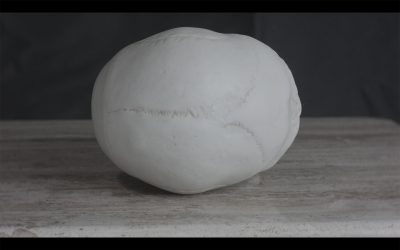You do see me crossing the meadow stiff and dead from the mist?
“You do see me crossing the meadow stiff
and dead from the mist?”
Text: ZHANG Yu-hang
In Hidetaka Miyazaki’s Dark Souls 3, “Aldrich, the Devourer of Gods” foresees the coming Age of the Deep Sea. In the game, the Age of the Deep Sea is (implicitly) described as a world where silence and all life will return to stillness, ruled by the ‘Deep’.
The Deep Sea is the ultimate in fascist aesthetics. The supremacy and fatalism of violence turn to a subtlety, long and deep silence. Most of the monsters in Dark Souls are silent, in Aleksandr Sokurov’s film, the Showa Emperor’s [1] Japanese phrases convey nothing. Upon entering the exhibition, The Smoking Lady smokes cigarettes in silence. Her delicate short hair is thought to confront an unpredictable fate, but it exposes her. Rather than fleeing from danger, she is herself the bait for that supreme violence. The exile of the refugees, the concentration camp, the germ experiments of Unit 8604, must have required a smoking beauty to complete the seduction of the victim’s complicity with the persecutor in “The Death’s Appointment in Samarra”, which the world mistakenly calls fate.
However, the fascist aesthetics is not bailed by the production of nostalgic Romanticist desires. In contrast, the Cold War spacecraft was derived from the angels in the ancient Greek frescoes and tantric mantras of Esoteric Buddhism, and the three narrow routes to “the Deep Sea” were, in fact, shortcuts in the vast system of warfare and material hubs that Japan used throughout Southeast Asia (including Southern China, Hong Kong, Taiwan and the Malay Peninsula, in fact from the British colonial period). And Hong Kong, whether as the “Pearl of the Orient” during the British colonial period, or as the hub of the cold and ambiguous love of Cyber in the 90s, or as the escapees of the present-day held hostage by the powers through the Hong Kong Extradition Bill, the “beauty” exudes a deadly allure on the Narrow Road. It is only that the model of the system and the plan is more real than the reality, where the undertones of reality deepen gradually, and the pure darkness awaits after the limits; the paradise always turns into a dark “Deep Sea”, where the waste disposal center of the whole system eventually engulfs everything. That’s why The Digger is a testament to the old alchemical maxim: As Above, So Below. The logistical chains of death soar and a magnificent yet inverted metropolis are built at the seabed. The Deep Sea is a matter, a hard and muddled substance. Mechanical and repetitive consumption, that is the figure that operates at the bottom of the sea.
The nature of the Japanese language is that it can convey messages while dissolving nothingness. Whether it is the rhyme of the refugees in the Nanshitou concentration camp (The Enka Singer) or the pale yet strong words delivered by the Japanese soldier while he was defending himself in the post-war Court-martial in Guangzhou in George and the Swimming Pool, their messages seem to dissipate into the uneven brick walls in the exhibition, reflecting the speechlessness of the skull stuck to the swimming pool. In George and the Swimming Pool and Outcast, the artist’s speech is clear and precise, almost to the point of ‘stickiness and dizziness’, and we cannot help but question if the monologue in Outcast is the sound of a living creature.
In Dark Souls 3, Aldrich attempts to continue the Age of the Deep Sea in his prophecy through eating people (and eventually, gods). Gradually, he comes to possess the minds and memories of the people and gods he devours. Unbeknownst to him, it is through his endless devouring that he becomes part of the Deep, just like Unit 8604’s bone-dissolving pool at Nanshitou, ‘made of human bodies, becomes the Deep Sea’, as the artist puts it.
You do see me crossing the meadow stiff
and dead from the mist?[4]
– Robert Walser
[1] Sokurov, Aleksandr, The Sun, 2005.
[2] Unit 8604 was the Japanese Guangzhou 8604th unit during the invasion of China, and is thought to have conducted germ warfare and live bacteriological experiments. The Nanshitou Refugee Camp mentioned in The Narrow Road to the Deep Sea series is thought to be associated with its bacteriological experiments.
[3] There was a merchant in Bagdad who sent his servant to market to buy provisions and in a little while the servant came back, white and trembling, and said, Master, just now when I was in the marketplace I was jostled by a woman in the crowd and when I turned I saw it was Death that jostled me. She looked at me and made a threatening gesture, now, lend me your horse, and I will ride away from this city and avoid my fate. I will go to Samarra and there Death will not find me. The merchant lent him his horse, and the servant mounted it, and he dug his spurs in its flanks and as fast as the horse could gallop he went. Then the merchant went down to the marketplace and he saw me standing in the crowd and he came to me and said, Why did you make a threating getsture to my servant when you saw him this morning? That was not a threatening gesture, I said, it was only a start of surprise. I was astonished to see him in Bagdad, for I had an appointment with him tonight in Samarra. (O’Hara, John, Appointment in Samarra, 1934).
[4] Walser, Rober, Oppressive Light: Selected Poems by Robert Walser, Black Lawrence Press, 2012.
